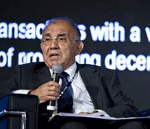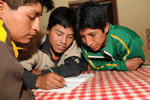Published on Sun, 2013-07-14 00:00
The United Nations’ Post-2015 Development Agenda should not simply extend MDGs, or reformulate the goals, but focus instead on global systemic reforms to remove main impediments to development and secure an accommodating international environment for sustainable development. This is a big, ambitious agenda which cannot be acted on overnight. An action plan for systemic reforms could be supplemented, but not substituted, by specific goals in some areas of economic and social development. |
Published on Sat, 2013-07-13 11:36
Slovenia has had the sharpest decline in GDP since 2008 of any euro-zone member apart from Greece, although it has so far avoided having to ask for external aid owing to having entered the crisis with a far lower sovereign debt burden. The new Government has indicated that it will continue to avoid a bailout by driving through changes including bank restructuring, privatizations, and pension and labour reforms. However, poverty has increased and many people are no longer able to meet basic needs; without state assistance, the poverty rate is estimated to rise to 24%. Those who can’t find work have dropped out of the labour force. As a result, Slovenia has joined countries where people have taken to the streets to call for a more just and balanced economy, more participatory democracy and the rule of law. |
Published on Thu, 2013-07-11 17:18
At a time when the United Nations Secretary General Ban Ki-moon is very close to finalizing and publishing its report "Accelerating progress towards the Millennium Development Goals and advancing the United Nations development agenda beyond 2015" to the United Nations General Assembly (NY, September 24, 2013), it is necessary for all organizations working for the right to education to mobilize NOW! It is URGENT that we submit our proposals. The report will be ready next week. |
Published on Thu, 2013-07-11 09:05
On June 25 and 26 June 2013, the Vienna+20 CSO Conference of more than 140 persons from various CSOs around the world gathered at Vienna on the occasion of the 20th anniversary of the 1993 World Conference on Human Rights and its Vienna Declaration and Programme of Action issued on June 25, 1993. Social Watch was represented by Kinda Mohamadieh. |
Published on Wed, 2013-07-10 17:56
Emerging from a sustainable development discourse saturated by “experts”, “eminent persons”, and professionals, the knowledge of people living in extreme poverty, based on lived reality, is crucial to the debate. The International Movement ATD Fourth World organized a two-day seminar, with participants who experience daily hardship, to demonstrate that those who have lived extreme poverty are best equipped to end it. Present at the seminar were also Amina Mohammed, Special Advisor of the Secretary-General on Post-2015 Development Planning; Olav Kjorven, Assistant Secretary-General at the United Nations Development Programme; as well as academics from Oxford University, UK, and practitioners in the field. |
SUSCRIBE TO OUR NEWSLETTER







